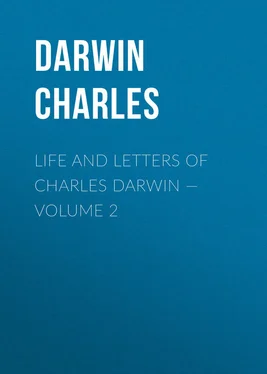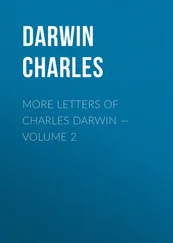Charles Darwin - Life and Letters of Charles Darwin — Volume 2
Здесь есть возможность читать онлайн «Charles Darwin - Life and Letters of Charles Darwin — Volume 2» — ознакомительный отрывок электронной книги совершенно бесплатно, а после прочтения отрывка купить полную версию. В некоторых случаях можно слушать аудио, скачать через торрент в формате fb2 и присутствует краткое содержание. Жанр: foreign_antique, foreign_prose, на английском языке. Описание произведения, (предисловие) а так же отзывы посетителей доступны на портале библиотеки ЛибКат.
- Название:Life and Letters of Charles Darwin — Volume 2
- Автор:
- Жанр:
- Год:неизвестен
- ISBN:нет данных
- Рейтинг книги:3 / 5. Голосов: 1
-
Избранное:Добавить в избранное
- Отзывы:
-
Ваша оценка:
- 60
- 1
- 2
- 3
- 4
- 5
Life and Letters of Charles Darwin — Volume 2: краткое содержание, описание и аннотация
Предлагаем к чтению аннотацию, описание, краткое содержание или предисловие (зависит от того, что написал сам автор книги «Life and Letters of Charles Darwin — Volume 2»). Если вы не нашли необходимую информацию о книге — напишите в комментариях, мы постараемся отыскать её.
Life and Letters of Charles Darwin — Volume 2 — читать онлайн ознакомительный отрывок
Ниже представлен текст книги, разбитый по страницам. Система сохранения места последней прочитанной страницы, позволяет с удобством читать онлайн бесплатно книгу «Life and Letters of Charles Darwin — Volume 2», без необходимости каждый раз заново искать на чём Вы остановились. Поставьте закладку, и сможете в любой момент перейти на страницу, на которой закончили чтение.
Интервал:
Закладка:
A. SEDGWICK.
CHARLES DARWIN TO T.H. HUXLEY. Down, December 25th [1859].
My dear Huxley,
One part of your note has pleased me so much that I must thank you for it. Not only Sir H.H. [Holland], but several others, have attacked me about analogy leading to belief in one primordial CREATED form. ('Origin,' edition i. page 484. — "Therefore I should infer from analogy that probably all the organic beings which have ever lived on this earth have descended from some one primordial form, into which life was first breathed.") (By which I mean only that we know nothing as yet [of] how life originates.) I thought I was universally condemned on this head. But I answered that though perhaps it would have been more prudent not to have put it in, I would not strike it out, as it seemed to me probable, and I give it on no other grounds. You will see in your mind the kind of arguments which made me think it probable, and no one fact had so great an effect on me as your most curious remarks on the apparent homologies of the head of Vertebrata and Articulata.
You have done a real good turn in the Agency business ("My General Agent" was a sobriquet applied at this time by my father to Mr. Huxley.) (I never before heard of a hard-working, unpaid agent besides yourself), in talking with Sir H.H., for he will have great influence over many. He floored me from my ignorance about the bones of the ear, and I made a mental note to ask you what the facts were.
With hearty thanks and real admiration for your generous zeal for the subject.
Yours most truly, C. DARWIN.
You may smile about the care and precautions I have taken about my ugly MS. (Manuscript left with Mr. Huxley for his perusal.); it is not so much the value I set on them, but the remembrance of the intolerable labour — for instance, in tracing the history of the breeds of pigeons.
CHARLES DARWIN TO J.D. HOOKER. Down, 25th [December, 1859].
... I shall not write to Decaisne (With regard to Naudin's paper in the 'Revue Horticole,' 1852.); I have always had a strong feeling that no one had better defend his own priority. I cannot say that I am as indifferent to the subject as I ought to be, but one can avoid doing anything in consequence.
I do not believe one iota about your having assimilated any of my notions unconsciously. You have always done me more than justice. But I do think I did you a bad turn by getting you to read the old MS., as it must have checked your own original thoughts. There is one thing I am fully convinced of, that the future progress (which is the really important point) of the subject will have depended on really good and well-known workers, like yourself, Lyell, and Huxley, having taken up the subject, than on my own work. I see plainly it is this that strikes my no-scientific friends.
Last night I said to myself, I would just cut your Introduction, but would not begin to read, but I broke down, and had a good hour's read.
Farewell, yours affectionately, C. DARWIN.
CHARLES DARWIN TO J.D. HOOKER. December 28th, 1859.
... Have you seen the splendid essay and notice of my book in the "Times"? (December 26th.) I cannot avoid a strong suspicion that it is by Huxley; but I never heard that he wrote in the "Times". It will do grand service...
C. DARWIN TO T.H. HUXLEY. Down, December 28th [1859].
My dear Huxley,
Yesterday evening, when I read the "Times" of a previous day, I was amazed to find a splendid essay and review of me. Who can the author be? I am intensely curious. It included an eulogium of me which quite touched me, though I am not vain enough to think it all deserved. The author is a literary man, and German scholar. He has read my book very attentively; but, what is very remarkable, it seems that he is a profound naturalist. He knows my Barnacle-book, and appreciates it too highly. Lastly, he writes and thinks with quite uncommon force and clearness; and what is even still rarer, his writing is seasoned with most pleasant wit. We all laughed heartily over some of the sentences. I was charmed with those unreasonable mortals, who know anything, all thinking fit to range themselves on one side. (The reviewer proposes to pass by the orthodox view, according to which the phenomena of the organic world are "the immediate product of a creative fiat, and consequently are out of the domain of science altogether." And he does so "with less hesitation, as it so happens that those persons who are practically conversant with the facts of the case (plainly a considerable advantage) have always thought fit to range themselves" in the category of those holding "views which profess to rest on a scientific basis only, and therefore admit of being argued to their consequences.") Who can it be? Certainly I should have said that there was only one man in England who could have written this essay, and that YOU were the man. But I suppose I am wrong, and that there is some hidden genius of great calibre. For how could you influence Jupiter Olympius and make him give three and a half columns to pure science? The old fogies will think the world will come to an end. Well, whoever the man is, he has done great service to the cause, far more than by a dozen reviews in common periodicals. The grand way he soars above common religious prejudices, and the admission of such views into the "Times", I look at as of the highest importance, quite independently of the mere question of species. If you should happen to be ACQUAINTED with the author, for Heaven-sake tell me who he is?
My dear Huxley, yours most sincerely, C. DARWIN.
[It is impossible to give in a short space an adequate idea of Mr. Huxley's article in the "Times" of December 26. It is admirably planned, so as to claim for the 'Origin' a respectful hearing, and it abstains from anything like dogmatism in asserting the truth of the doctrines therein upheld. A few passages may be quoted: — "That this most ingenious hypothesis enables us to give a reason for many apparent anomalies in the distribution of living beings in time and space, and that it is not contradicted by the main phenomena of life and organisation, appear to us to be unquestionable." Mr. Huxley goes on to recommend to the readers of the 'Origin' a condition of "thatige Skepsis" — a state of "doubt which so loves truth that it neither dares rest in doubting, nor extinguish itself by unjustified belief." The final paragraph is in a strong contrast to Professor Sedgwick and his "ropes of bubbles" (see below). Mr. Huxley writes: "Mr. Darwin abhors mere speculation as nature abhors a vacuum. He is as greedy of cases and precedents as any constitutional lawyer, and all the principles he lays down are capable of being brought to the test of observation and experiment. The path he bids us follow professes to be not a mere airy track, fabricated of ideal cobwebs, but a solid and broad bridge of facts. If it be so, it will carry us safely over many a chasm in our knowledge, and lead us to a region free from the snares of those fascinating but barren virgins, the Final Causes, against whom a high authority has so justly warned us."
There can be no doubt that this powerful essay, appearing as it did in the leading daily Journal, must have had a strong influence on the reading public. Mr. Huxley allows me to quote from a letter an account of the happy chance that threw into his hands the opportunity of writing it.
"The 'Origin' was sent to Mr. Lucas, one of the staff of the "Times" writers at that day, in what I suppose was the ordinary course of business. Mr. Lucas, though an excellent journalist, and, at a later period, editor of 'Once a Week,' was as innocent of any knowledge of science as a babe, and bewailed himself to an acquaintance on having to deal with such a book. Whereupon he was recommended to ask me to get him out of his difficulty, and he applied to me accordingly, explaining, however, that it would be necessary for him formally to adopt anything I might be disposed to write, by prefacing it with two or three paragraphs of his own.
Читать дальшеИнтервал:
Закладка:
Похожие книги на «Life and Letters of Charles Darwin — Volume 2»
Представляем Вашему вниманию похожие книги на «Life and Letters of Charles Darwin — Volume 2» списком для выбора. Мы отобрали схожую по названию и смыслу литературу в надежде предоставить читателям больше вариантов отыскать новые, интересные, ещё непрочитанные произведения.
Обсуждение, отзывы о книге «Life and Letters of Charles Darwin — Volume 2» и просто собственные мнения читателей. Оставьте ваши комментарии, напишите, что Вы думаете о произведении, его смысле или главных героях. Укажите что конкретно понравилось, а что нет, и почему Вы так считаете.












